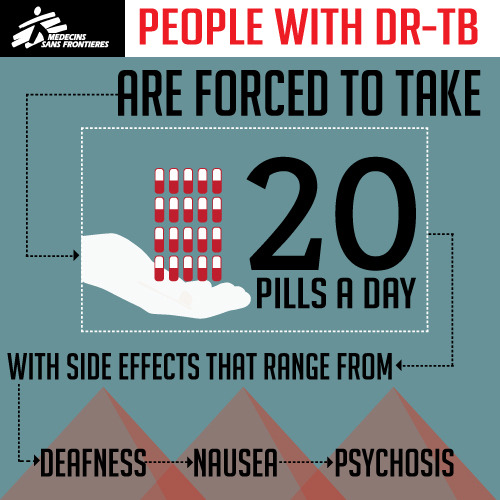Current treatment for dr-tb is complex and inadequate. For the first time in half a century drugs that could cure DR-TB are being tested, but the global health community needs to act fast.
Drug-resistant tuberculosis: we can stop this epidemic in its tracks
This article was originally published on The Guardian
DR-TB is a public health crisis that is spiralling out of control – the latest statistics from the World Health Organisation suggest more than 300,000 new cases every year among notified TB cases, a figure that Medecins Sans Frontieres/Doctors Without Borders (MSF) considers conservative based on the growing number of DR-TB patients in our projects. Once the preserve of people who had received incomplete or incorrect TB treatment, a growing number of people with DR-TB are presenting who have never had TB treatment before, which shows that DR-TB is becoming an epidemic in its own right.
Yet, the tools to tackle the disease remain woefully inadequate. People with DR-TB are forced to take up to 20 pills a day with excruciating side effects that range from deafness to nausea and psychosis. For healthcare professionals, the treatment is complex: individualised for each patient based on drug resistance patterns, and expensive, with drugs alone costing up to $ 6,000 (£3,962) per person for a treatment course. And even then, patients only have a 50% chance of cure.
However, after half a century of neglect there is a historic opportunity for change. The drug pipeline for TB is the best it has ever been, with 10 drugs in clinical testing. At the very end of 2012, the US Food and Drug Administration approved bedaquiline or Sirturo, the first dedicated new TB drug since 1963, while another drug, delamanid is currently undergoing review by the European Medicines Agency. Both drugs arecompletely new classes of antibiotics with no reported resistance, and represent an unprecedented opportunity to improve treatment for DR-TB.
So what do these developments mean for global health professionals – particularly those on the front-line treating TB in communities?
These new drugs could be game-changers and the TB community must urgently work out how best to use them. They offer the potential to make DR-TB treatment shorter, more effective and more tolerable, with fewer side effects. The first step is to make these new drugs available for research and ensure they are quickly registered in high-burden countries. The manufacturers must also make sure the drugs are affordable in low- and middle-income countries, eg through generic production.
The response of drug manufacturers to generic HIV drugs is perhaps the best incentive to do things differently with DR-TB: before the introduction of generic competition in 2001, antiretrovirals to treat HIV cost over US$10,000 per person per year and very few people in developing countries could afford that. As a result, millions of people died and the peak of AIDS related-deaths didn’t occur until 2005. Since 2001, the price has come down nearly 99% and people now have access to affordable medicines. With eight million people now on treatment, the curve of AIDS related-deaths has started to fall, but we still need to expand access to a total of 15 million people by 2015. New infections are also falling.
124 notes
 freedomforeverybody118 liked this
freedomforeverybody118 liked this tyezhabuetti liked this
kafkasapartment liked this
desalona liked this
green-growth-blog1 reblogged this from upworthy
thecollegetradingpost-blog reblogged this from upworthy
vagabondoperatic liked this
khealywu liked this
roc-ness reblogged this from erylsh-blog
roc-ness liked this
shitgossipgirlspot liked this
anthaila liked this
garzatheblog liked this
thepoisonedivey reblogged this from upworthy
thepoisonedivey liked this
howarththoudominic reblogged this from upworthy
jesusgun liked this
dew0319 liked this
upworthy reblogged this from doctorswithoutborders
yellowkitchendreams-blog liked this
afaanaut reblogged this from doctorswithoutborders
www-outerspacepi reblogged this from doctorswithoutborders
www-outerspacepi liked this
hugonoturno reblogged this from doctorswithoutborders
chocolate-soldier liked this
misswalt reblogged this from doctorswithoutborders
waywardfishmonster-blog liked this
postcolonialsoul-blog reblogged this from doctorswithoutborders
diegomolano-blog liked this
cchimsuan liked this
onthesun18 reblogged this from doctorswithoutborders
doctorswithoutborders posted this
- Show more notes

